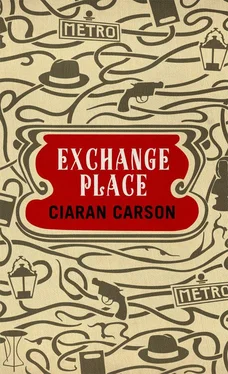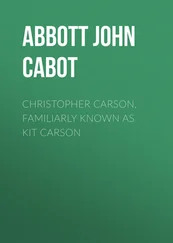The radio went dead. I twiddled the knob; but instead of the mysterious broadcast, a Radio Ulster news bulletin came on, announcing that a suspect device had been found in the vicinity of Corporation Square and that the area… I switched to CD mode, and drove into town, listening to Contrapunctus XIV unfold itself, as I had so many times before, hearing different permutations in it every time, echoes overlaying other echoes. The traffic was slower than usual due to the putative bomb; but as it happened, the journey took precisely the twelve minutes and eighteen seconds of Gould’s playing, for the music came to a stop with that familiar gunshot of silence just as I parked behind the Central Library: a happy coincidence that I thought augured well for the day. I had still a good three-quarters of an hour before my assignation. On a whim I decided to revisit Exchange Place. It had been some years since I had been there, but my thinking about Harland had become more productive of late, and I was sure the sight of the place would prompt new memories. As I entered the narrow entry I remarked, as I had so many times before, the cannon-shaped iron bollards that flanked the entrance, bearing the dints and dents of so many years of traffic. My feet on the cobblestones passed over the footfall of so many others, including my own, because I was someone other then: I did not know then what I now suspect. I came to the door of 14 Exchange Place to find it open. I entered. The vestibule had an air of disuse. I rapped on the door of Federman the stationer, whose depot took up the ground floor. I rapped again, and it opened to reveal the man himself, not much changed since I had seen him last, and still with a pencil in the breast pocket of the tan cotton drill shop-coat he’d worn ever since I’d known him. He threw himself back in mock surprise. If it isn’t himself! he cried, returned from the dead, John Kilfeather, how are you? and he thrust his hand forward. We made some small talk before I came to the question. And Harland? I said, have you heard anything more of him? Well, said Federman, you know how I felt about him even before he took off, and nothing much has happened since to make me change my mind. But would you listen to me? And as I listened to him I knew that he was right. We had talked of these matters before at some length. But somehow or other I never thought of asking to see the attic studio back then, perhaps it was a matter of pride; I thought of the enquiries I had conducted as being casual and perfunctory, but in retrospect I can see that Federman would have thought otherwise. So I put the next question to him. But of course! he cried, I thought you’d never ask! And he went into the shop and came out with a key. Onwards and upwards! he cried, and I mounted the long, high, narrow stair to the attic studio, my passage lit by a skylight in the roof of the stairwell, my heart quickening with every tread.
I put the key in the door and had to jiggle it a bit before the lock gave. I entered to find the studio in what must have been the state that he left it in. There was the familiar chaos dimly replicated in the deteriorating mirror: crumpled images lying amid crumpled champagne boxes, layers of stuff that had been walked upon by Harland. I scuffled some of it about with my shoe, something I would never have dared to do before, when I tiptoed my way gently through it as I would through an precarious labyrinth. I looked down. The scuffling had revealed a pale blue cover like those of the school exercise books in which Harland kept a journal of sorts, not that I had ever read it. I picked it up with some trepidation. Even now I hesitated to intrude on his innermost thoughts, if that was what they were. I put that thought behind me, opened the book, and read these words in Harland’s writing:
Research has shown that the hippocampus region of the brain is specifically responsible for processing memory. It is so called because its shape resembles that of the seahorse, in Latin called hippocampus . Coral reefs are a favourite habitat of the seahorse, and I sometimes like to think of human consciousness as one of those vast underwater cities whose fabric is accumulated from the skeletons of its builders: a necropolis which teems with life. Here are massive blocks and towers of stone, hanging gardens of the most varied hues, purple, emerald and amethyst, which undulate and flicker beautifully in the transparent water. Fishes skim the galleries and avenues like flocks of birds, and the nooks and crannies are populated by a myriad of other species. What can the little seahorse know of this fantastic ecosystem? We cannot know. But we can say that its experience is a microcosm of the ongoing, thousands of years old saga that is the life of a coral reef, and which, like the human brain, we have yet to fully fathom.
The passage was familiar to me from somewhere. My heart gave a lurch as I realized that it had come from my abandoned novel, X + Y = K .
Stand and Unfold Yourself
As Kilpatrick put the ring-binder in his briefcase he noticed a suitcase on the floor of the kneehole of the desk. He took off the suit jacket and laid it on the desk and then, with some difficulty, manipulated the mannequin until he had divested it of its trousers. He folded jacket and trousers neatly and put them in the suitcase, lifted both cases, went out the door, locked it, and made his way back to Hôtel Chopin. In Room 36 he took out the ring binder, opened it at random, and read these words:
When an organism interacts with an object, be it within body boundaries (for example, pain) or outside of them (for example, a landscape), it creates a narrative. This is true whether the object be perceived in the present moment, or recalled, for the past continues to influence our behaviour. The hippocampus is a vital structure in the mapping of multiple, concurrent stimuli. It receives signals related to activity in all sensory cortices, which arrive indirectly at the end of several projection chains with multiple synapses, and reciprocates signals via backward projections along the same chains. In plain speech, it is the instrument by which we assemble ourselves. A human being is a story-telling machine, and the self is a centre of narrative gravity. Patients who have suffered severe lesions to the hippocampus lose the story of themselves: they are bereft of a past and of an anticipated future. They live in an eternal present, in which there is no elsewhere, no before, no after. Their wives, their husbands, their family and friends are constant and surprising strangers to them.
I see from your record, Mr Kilpatrick, that you are prone to bouts of amnesia: what we call transient global amnesia, specifically. It is a condition especially associated with migraine, and there can be little doubt that the electrical activity of migraine sometimes affects the hippocampus, causing temporary lapses in the processing of information. In these episodes — typically, they last for a few hours, usually less than a day — the otherwise entirely normal person is suddenly deprived of the records that have been recently added to the autobiographical memory. The immediate past, the past of the minutes just before, of the hours before, is a blank. Moreover, since our memory of the here and now also includes memories of the events we constantly anticipate — what I like to call memories of the future — it follows that the person struck by such amnesia will have no memory regarding what he intended for the minutes or the hours or days ahead. The idea of the future does not exist for him. Typically, the transient global amnesiac repeats the same questions: Where am I? What am I doing here? How did I come here? The case of K, if we might call you that for now, is especially fascinating, since it would seem that at times the narrative void caused by such attacks is bridged by K’s alternative personality, the simulacrum K created as a child. Let us call this alter ego Mr X. When K’s memory fails, X steps into the breach. Remember, X is not a simple stand-in, an ambitious understudy waiting in the wings for that moment when the leading man is laid low by some catastrophe, whether planned or accidental. Rather, it is as if Hamlet were replaced by Fortinbras, the thinker by the man of action. And Hamlet is a play about the narratives we create for ourselves, is it not? The parts we play? It concerns being or not being. That is the question. And the play starts with a question of identity. Act One, Scene One, line one: Who’s there?
Читать дальше












